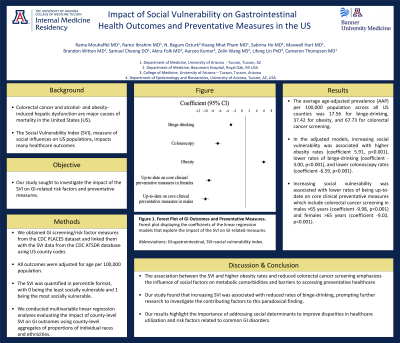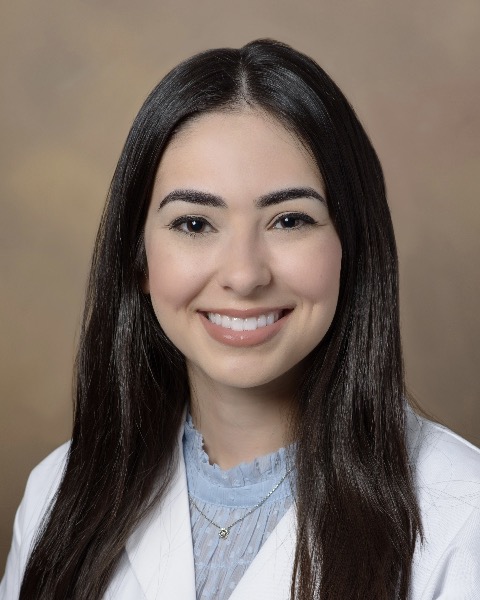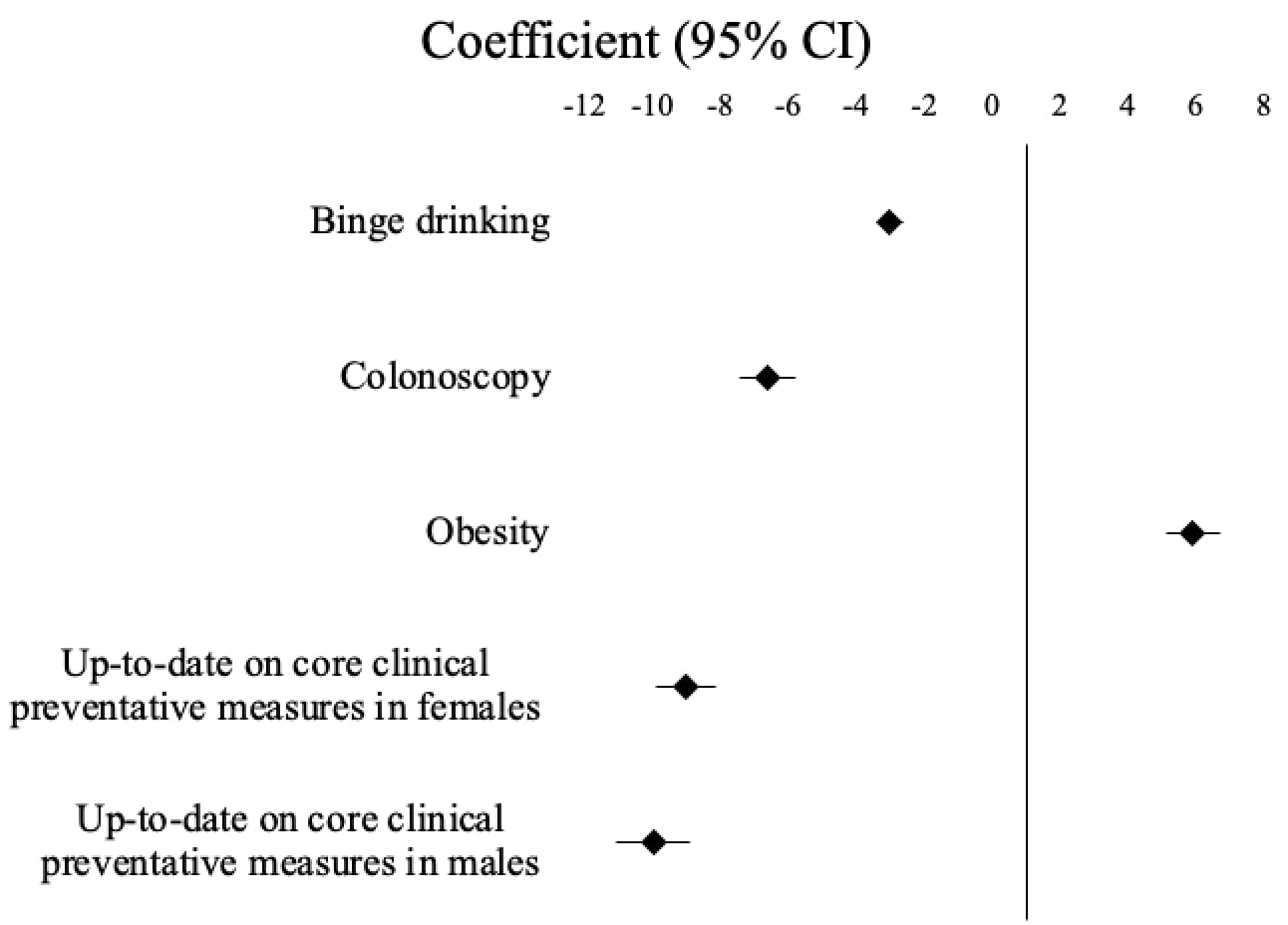Sunday Poster Session
Category: Colorectal Cancer Prevention
P0392 - Impact of Social Vulnerability on Gastrointestinal Health Outcomes and Preventative Measures in the US
Sunday, October 27, 2024
3:30 PM - 7:00 PM ET
Location: Exhibit Hall E

Has Audio

Rama Mouhaffel, MD
Banner - University of Arizona
Tucson, AZ
Presenting Author(s)
Rama Mouhaffel, MD1, Ramzi Ibrahim, MD1, Nazli Begum Ozturk, MD2, Hoang Nhat Pham, MD1, Sabrina Ho, MD1, Maxwell Hart, MD, MEd1, Brandon Witten, MD3, Samuel H. Cheong, DO1, Akira Folk, DO1, Aarzoo Kumar, BS1, Zelin Wang, MS4, Lifeng Lin, PhD4, Cameron Thompson, MD1
1Banner - University of Arizona, Tucson, AZ; 2Corewell Health William Beaumont University Hospital, Royal Oak, MI; 3University of Arizona College of Medicine, Tucson, AZ; 4University of Arizona, Tucson, AZ
Introduction: Colorectal cancer and alcohol- and obesity-induced hepatic dysfunction are major causes of mortality in the United States (US). The Social Vulnerability Index (SVI), measure of social influences on US populations, impacts many healthcare outcomes. Within the CDC PLACES dataset, prevalence of colorectal cancer screening, binge-drinking, and obesity rates are publicly available. Our study sought to investigate the impact of the SVI on GI-related risk factors and preventative measures.
Methods: We obtained GI screening/risk factor measures from the CDC PLACES dataset and linked them with the SVI data from the CDC ATSDR database using US county codes. All outcomes were adjusted for age per 100,000 population. The SVI was quantified in percentile format, with 0 being the least socially vulnerable and 1 being the most socially vulnerable. We conducted multivariable linear regression analyses evaluating the impact of county-level SVI on GI outcomes using county-level aggregates of proportions of individual races and ethnicities.
Results: A total of 3,144 US counties were included in our analysis. The average age-adjusted prevalence (AAP) per 100,000 population across all US counties was 17.56 for binge-drinking, 37.42 for obesity, and 67.73 for colorectal cancer screening. In the adjusted models, increasing social vulnerability was associated with higher obesity rates (coefficient 5.91, p< 0.001), lower rates of binge-drinking (coefficient -3.00, p< 0.001), and lower colonoscopy rates (coefficient -6.59, p< 0.001). Increasing social vulnerability was associated with lower rates of being up-to-date on core clinical preventative measures which include colorectal cancer screening in males >65 years (coefficient -9.98, p< 0.001) and females >65 years (coefficient -9.02, p< 0.001).
Discussion: Our results revealed the impact of social vulnerability on GI health outcomes and preventative measures in the US. The association between the SVI and higher obesity rates and reduced colorectal cancer screening emphasizes the influence of social factors on metabolic comorbidities and barriers to accessing preventative healthcare. Our study found that increasing SVI was associated with reduced rates of binge-drinking, prompting further research to investigate the contributing factors to this paradoxical finding. Our results highlight the importance of addressing social determinants to improve disparities in healthcare utilization and risk factors related to common GI disorders.

Disclosures:
Rama Mouhaffel, MD1, Ramzi Ibrahim, MD1, Nazli Begum Ozturk, MD2, Hoang Nhat Pham, MD1, Sabrina Ho, MD1, Maxwell Hart, MD, MEd1, Brandon Witten, MD3, Samuel H. Cheong, DO1, Akira Folk, DO1, Aarzoo Kumar, BS1, Zelin Wang, MS4, Lifeng Lin, PhD4, Cameron Thompson, MD1. P0392 - Impact of Social Vulnerability on Gastrointestinal Health Outcomes and Preventative Measures in the US, ACG 2024 Annual Scientific Meeting Abstracts. Philadelphia, PA: American College of Gastroenterology.
1Banner - University of Arizona, Tucson, AZ; 2Corewell Health William Beaumont University Hospital, Royal Oak, MI; 3University of Arizona College of Medicine, Tucson, AZ; 4University of Arizona, Tucson, AZ
Introduction: Colorectal cancer and alcohol- and obesity-induced hepatic dysfunction are major causes of mortality in the United States (US). The Social Vulnerability Index (SVI), measure of social influences on US populations, impacts many healthcare outcomes. Within the CDC PLACES dataset, prevalence of colorectal cancer screening, binge-drinking, and obesity rates are publicly available. Our study sought to investigate the impact of the SVI on GI-related risk factors and preventative measures.
Methods: We obtained GI screening/risk factor measures from the CDC PLACES dataset and linked them with the SVI data from the CDC ATSDR database using US county codes. All outcomes were adjusted for age per 100,000 population. The SVI was quantified in percentile format, with 0 being the least socially vulnerable and 1 being the most socially vulnerable. We conducted multivariable linear regression analyses evaluating the impact of county-level SVI on GI outcomes using county-level aggregates of proportions of individual races and ethnicities.
Results: A total of 3,144 US counties were included in our analysis. The average age-adjusted prevalence (AAP) per 100,000 population across all US counties was 17.56 for binge-drinking, 37.42 for obesity, and 67.73 for colorectal cancer screening. In the adjusted models, increasing social vulnerability was associated with higher obesity rates (coefficient 5.91, p< 0.001), lower rates of binge-drinking (coefficient -3.00, p< 0.001), and lower colonoscopy rates (coefficient -6.59, p< 0.001). Increasing social vulnerability was associated with lower rates of being up-to-date on core clinical preventative measures which include colorectal cancer screening in males >65 years (coefficient -9.98, p< 0.001) and females >65 years (coefficient -9.02, p< 0.001).
Discussion: Our results revealed the impact of social vulnerability on GI health outcomes and preventative measures in the US. The association between the SVI and higher obesity rates and reduced colorectal cancer screening emphasizes the influence of social factors on metabolic comorbidities and barriers to accessing preventative healthcare. Our study found that increasing SVI was associated with reduced rates of binge-drinking, prompting further research to investigate the contributing factors to this paradoxical finding. Our results highlight the importance of addressing social determinants to improve disparities in healthcare utilization and risk factors related to common GI disorders.

Figure: Figure 1. Forest Plot of GI Outcomes and Preventative Measures. Forest plot displaying the coefficients of the linear regression models that explore the impact of the SVI on GI-related measures.
Abbreviations: GI=gastrointestinal, SVI=social vulnerability index.
Abbreviations: GI=gastrointestinal, SVI=social vulnerability index.
Disclosures:
Rama Mouhaffel indicated no relevant financial relationships.
Ramzi Ibrahim indicated no relevant financial relationships.
Nazli Begum Ozturk indicated no relevant financial relationships.
Hoang Nhat Pham indicated no relevant financial relationships.
Sabrina Ho indicated no relevant financial relationships.
Maxwell Hart indicated no relevant financial relationships.
Brandon Witten indicated no relevant financial relationships.
Samuel Cheong indicated no relevant financial relationships.
Akira Folk indicated no relevant financial relationships.
Aarzoo Kumar indicated no relevant financial relationships.
Zelin Wang indicated no relevant financial relationships.
Lifeng Lin indicated no relevant financial relationships.
Cameron Thompson indicated no relevant financial relationships.
Rama Mouhaffel, MD1, Ramzi Ibrahim, MD1, Nazli Begum Ozturk, MD2, Hoang Nhat Pham, MD1, Sabrina Ho, MD1, Maxwell Hart, MD, MEd1, Brandon Witten, MD3, Samuel H. Cheong, DO1, Akira Folk, DO1, Aarzoo Kumar, BS1, Zelin Wang, MS4, Lifeng Lin, PhD4, Cameron Thompson, MD1. P0392 - Impact of Social Vulnerability on Gastrointestinal Health Outcomes and Preventative Measures in the US, ACG 2024 Annual Scientific Meeting Abstracts. Philadelphia, PA: American College of Gastroenterology.
